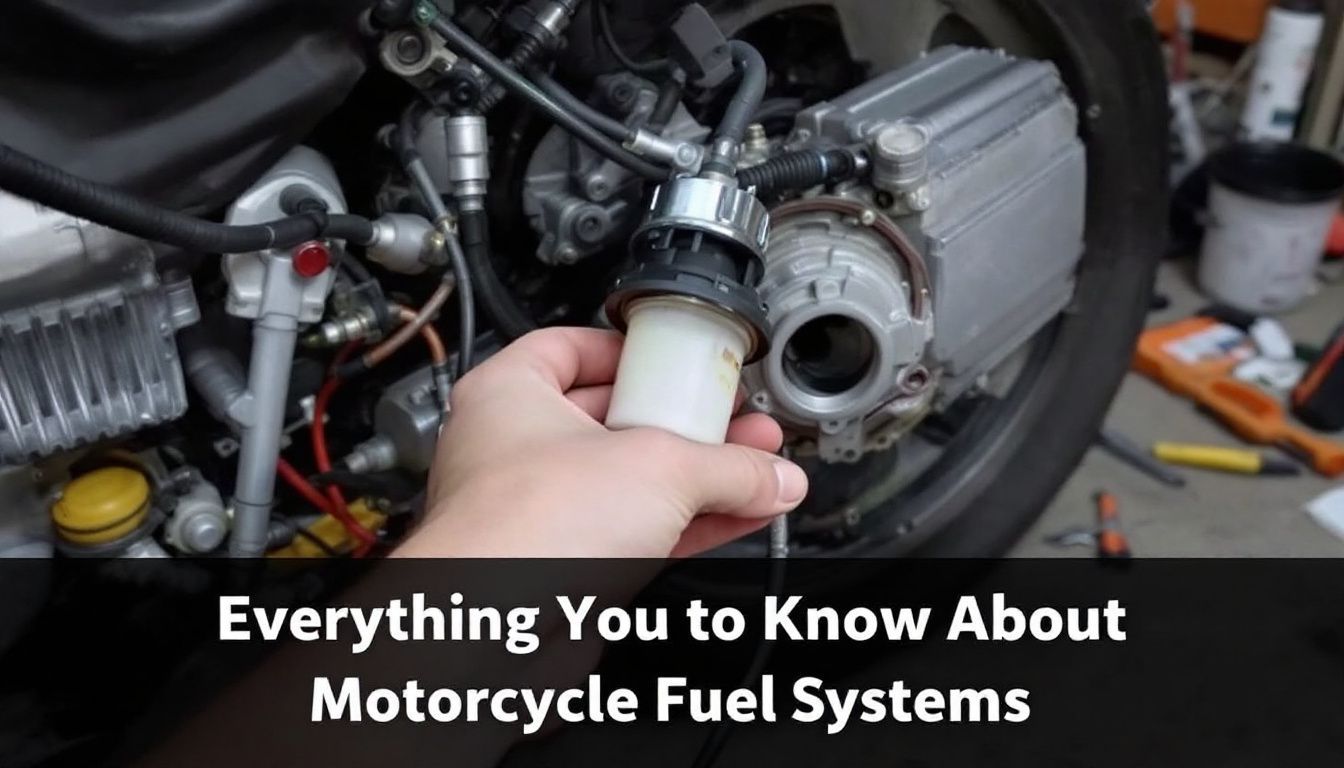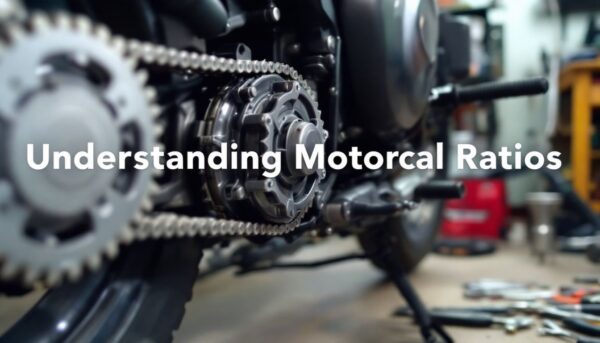
Everything You Need to Know About Motorcycle Fuel Systems
Your motorbike might not be running as well as it should, and you’re wondering why. You’re keen to fix the problem yourself. A key fact is that your motorcycle’s fuel system plays a big role in how well your bike runs.
This article will show you how to keep your motorcycle’s engine humming nicely by looking after its fuel system.
You’ll learn about different types of petrol, what octane levels mean, and why ethanol matters. We’ll also cover common issues like dirty fuel filters and carburetor problems, plus how to fix them.
If you love doing things on your own, this guide is for you. Keep reading to sort out your bike’s fuel troubles!
Key Takeaways
- Check your motorcycle’s fuel type and octane level. Use higher octane for better performance.
- Keep the fuel system clean. Change or clean the fuel filter to avoid engine problems.
- Watch out for ethanol in pump gas. It can lower fuel quality over time, especially if older than 4-8 weeks.
- Clean and adjust your carburetor regularly to keep your bike running smoothly.
- Use a motorcycle code reader to find and fix any issues early on for better fuel economy.
Understanding Motorcycle Fuel Systems
Motorcycle fuel systems are key to how your bike runs. They manage the flow of fuel and air needed for combustion in the engine.
Types of Fuel: pump gas, performance fuels
Motorcycles need the right fuel to run well. Different types of fuel suit different bikes.
- Pump Gas: This is the common petrol you find at most service stations. It often contains ethanol, which can raise its octane level. Ethanol is a mixed blessing; it helps refine gas but may affect performance if your bike isn’t designed for it.
- Performance Fuels: These are specially blended fuels made to improve your bike’s power and efficiency. They usually have higher octane ratings, helping engines resist ignition when under high pressure or temperature. Always check your owner’s manual to see if your motorcycle supports these fuels.
- Octane Levels: For motorcycles, higher octane petrol is better for performance and engine health. It prevents knocking and helps in better throttle response.
- Fuel Density: Selecting the right fuel also depends on its density. Fuel that sits too long can lose effectiveness after 4-8 weeks without fresh petrol added.
- Quality Fuel: Using quality fuel improves overall motorcycle fuel efficiency and reduces issues with the fuel system.
Following this guide will help you choose the best type of fuel for your bike while enhancing its performance and longevity as you ride into the next section about common issues with motorcycle fuel systems.
Octane levels and ethanolOctane levels matter for your motorcycle’s performance. Higher octane petrol helps resist ignition under high temperature or pressure. Always choose higher-octane fuel whenever you can.
Check your owner’s manual to know what octane level suits your bike.
Ethanol is often added to pump gas. It allows refiners to lower the gasoline portion and still raise the overall octane level. While it helps, fuels with ethanol can degrade over time.
If petrol is older than 4-8 weeks without fresh fuel being added, you may experience reduced performance. Make sure to select the best fuel type for your specific motorcycle model for better engine health and efficiency.
Common Issues with Motorcycle Fuel Systems
Common problems affect motorcycle fuel systems. Clogged fuel filters and carburetor issues can lead to poor engine performance.
Dirty or clogged fuel filters
Dirty or clogged fuel filters can cause big problems for your motorcycle. They stop the right amount of fuel from reaching your engine. This lack of fuel affects performance and makes it hard to start your bike.
Regular maintenance helps keep these filters clean.
Check the fuel filter often, especially if you notice poor acceleration or stalling. If it’s dirty, clean or replace it quickly. Using quality fuel can help reduce dirt in the system too.
Always ensure your motorcycle’s fuel delivery system is working well for better gas mileage and engine health.
Carburetor problems
Carburetor problems can hurt your motorcycle’s performance. A clogged carburetor limits fuel flow. This can lead to rough idling or stalling. Some bikes have a gravity-feed system, which makes it vital for the tank to be higher than the carburetor.
If not, fuel won’t reach it properly.
Old or dirty fuel also affects how well a carburetor works. Fuel loses its effectiveness after 4-8 weeks if no fresh petrol is added. You may see symptoms like hard starting or poor acceleration because of this issue.
It’s important to check and clean your carburetor regularly.
Adjustments might be necessary if you notice performance issues. Cleaning the jets and float chamber helps restore function too. Using quality motorcycle fuel will keep everything running smoothly, especially with high-octane petrol suited for your bike model as mentioned in the owner’s manual.
Using a motorcycle code reader
Using a motorcycle code reader can help you find problems with your bike’s fuel system. This tool reads error codes from your motorcycle’s computer. These codes tell you if there is an issue with the fuel injector, fuel delivery system, or other components.
If your motorcycle has a clogged fuel filter or carburetor problems, the code reader will show it clearly. You can use this information to address issues early. Regular checks with a code reader also support better performance and improve fuel economy.
Understanding these codes boosts your knowledge about motorcycle maintenance. It helps you make informed decisions for repairs or replacements. Knowing what affects your engine will lead to improved riding experiences and better overall care for your motorcycle’s fuel system.
How to Fix Motorcycle Fuel System Problems
You can clean or replace the fuel filter. This helps your bike run better and use less fuel.
Cleaning or replacing the fuel filter
Cleaning or replacing the fuel filter is crucial for your motorcycle’s performance. A dirty or clogged fuel filter can restrict flow and cause engine issues. Regular checks will help maintain a smooth ride.
If cleaning does not work, you may need to replace it. This step ensures that only clean fuel reaches the engine. Always use high-quality parts when doing this job. Good maintenance helps improve motorcycle fuel economy and consumption, ensuring your ride runs efficiently.
Adjusting or cleaning the carburetor
Adjusting or cleaning the carburetor is vital for your motorcycle’s fuel system. A dirty carburetor can cause problems like poor performance and rough idling. Start by removing the carburetor from your bike.
Check for dirt or buildup inside it. Use a spray cleaner to clear out any gunk. Make sure to clean all jets and passages.
After cleaning, you can adjust the mixture screws for better performance. This helps control how much fuel mixes with air in your engine. Ensure you follow your owner’s manual to find the right settings for your specific model.
Keep in mind that a well-maintained carburetor improves motorcycle fuel consumption and efficiency.
Always check if older fuel affects performance too. If petrol has sat for 4-8 weeks, it may reduce effectiveness when used with your carbureted motorcycle. Fresh petrol will help keep everything running smoothly, so don’t skip this step! Regular maintenance helps avoid costly problems down the line.
Preventing and Maintaining Motorcycle Fuel Systems
To keep your motorcycle running well, do regular checks on the fuel system. Use good quality fuel and clean parts often to avoid problems down the road.
Regular maintenance and using quality fuelRegular maintenance helps your motorcycle run well. Clean the fuel filter often to avoid dirt getting into the fuel system. Always use quality fuel for better performance. Higher-octane petrol is best for motorcycles.
Check your owner’s manual to see if it supports higher octane levels.
Using pump gas with ethanol can be risky. Ethanol lowers the quality of the fuel over time, especially if it’s older than 4-8 weeks. This can make your bike perform poorly. Choose a good brand and keep an eye on the fuel density too.
Good care of your motorcycle’s engine starts with proper fuel management and routine checks of its parts.
Importance of understanding engine and fuel systems
Understanding your motorcycle’s engine and fuel systems is key to keeping it running well. The fuel system includes parts like the fuel tank, fuel pump, and filters. Knowing how these parts work together helps prevent issues like poor performance or breakdowns.
Using the right type of fuel matters. Higher-octane petrol can improve how your motorcycle runs under high temperatures or pressure. Always consult your owner’s manual to see what octane rating suits your model best.
Regular maintenance ensures a clean fuel delivery system and helps you enjoy riding without worries.
Conclusion
You now know the basics of motorcycle fuel systems. Keeping your fuel system in good shape is key to a smooth ride. Use high-octane fuel for better performance. Regular maintenance will help avoid common problems.
Stay informed, and enjoy your rides!
FAQs
1. What is the role of a motorcycle fuel system?
The motorcycle fuel system, which includes the fuel tank, injector and delivery system, plays a crucial part in running your bike’s engine by managing how much petrol goes into it.
2. How can I maintain my motorcycle’s fuel system?
To keep your motorcycle’s fuel system in top condition, you should regularly check and replace parts like the fuel filter and lines if needed. You also need to manage your motorcycle’s fuel tank capacity effectively.
3. What are some useful additives for my motorcycle’s fuel?
Motorcycle fuels often benefit from certain additives that help clean the injection system and improve performance. These could affect things like octane rating too.
4. Can you tell me more about a motorcycle’s fuel injection system?
A motorbike’s injection or ‘fuel injector’ is an important part of its overall delivery setup – it helps control how much petrol gets to the engine.
5. Why does octane rating matter for my bike’s petrol?
The octane rating of your bike’s petrol matters because it affects how well your engine runs; higher ratings usually mean smoother rides.


